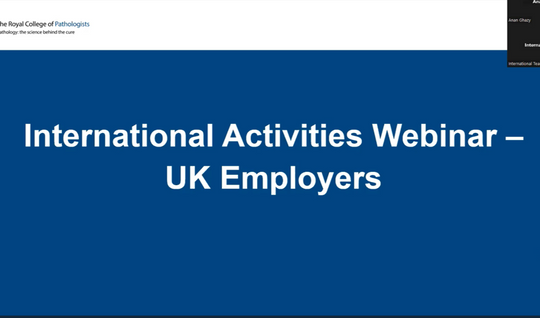Employing bodies – Information for the RCPath Sponsorship and MTI schemes
The College has participated in the GMC sponsorship scheme, allowing us to sponsor International Medical Graduates for GMC full registration and a licence to practise for many years. The Medical Training Initiative (MTI) was subsequently launched by the Department of Health in 2009. It is designed to allow medical graduates to come to the UK to undertake clinical training in the NHS for a maximum of 24 months before returning to their home country, providing they have the support of the relevant Royal College. This page contains information for Employing bodies and hospitals looking to employ international medical graduates who are entering the UK via either route.
The benefits of the sponsorship and MTI schemes to employing bodies
Both schemes benefit the employing body and the doctor because they offer hospitals the opportunity to fill posts with qualified international medical graduates, whilst providing a good quality training opportunity for such doctors.
Overview of requirements
To enter the UK under the MTI scheme the doctor will apply for a Tier 5 temporary exchange visa. The employing body will not act as the sponsor for the applicant, instead the Academy of Medical Royall Colleges (AoMRC)will because they are the national umbrella body that handle UKVI approvals.
The employing bodies must provide a job description for the MTI role which needs to include a structured timetable where the duties and educational/training component of the role are clearly outlined. An educational supervisor needs be listed.
For both the sponsorship and MTI routes, employing bodies must ensure that the International Medical Graduate (IMG) they are seeking to employ has met all General Medical Council (GMC) requirements for Full Registration via the General Medical Council Sponsorship route, to prevent any delays to the IMG starting their post. The requirements for GMC registration include:
- Passport
- Primary Medical Qualification (e.g. MBBS) certificate in the original language and translated if necessary.
- Letter from Dean/Principal of Medical School (this must include dates of attendance, confirmation of completion of degree and degree title, satisfactory conduct. Name must match that on PMQ certificate)
- Pre-registration verification of Primary Medical Qualification. Applicants must have their qualifications verified by the Educational Commision for Foreign Medical Graduates. Further information is available on the GMC website.
- Certificate of completion of internship OR a letter of experience from relevant hospital/University (this must confirm attendance dates, any specialties undertaken and that conduct was satisfactory, and be translated if necessary)
- Certificate of Good Standing from each country where training has been undertaken. This must include 1 from the current country of work, granted within the last 3 months.
- Postgraduate medical qualification in the original language and translated if necessary.
- Letter from the Dean/Principal of the Postgraduate Institution (this must include dates of attendance, confirmation of completion of degree and degree title and satisfactory conduct. (Name must match that on PGQ certificate).
- Syllabus/curriculum signed by the relevant authorities (translated if necessary, candidates will sometimes submit originals for this).
- Letter from the relevant medical regulatory authority confirming that the post-graduate qualification and institution was recognised by them at the time of completion (in the case of Indian qualifications check the MCI website too).
- Letters confirming training (i.e. evidence from the hospital(s) to confirm training undertaken in that/those hospital(s) and was undertaken in approved posts)
- Certificate of completion of the FRCPath Part I exam (desirable)
- An employment history showing engagement in medical practice for at least 36 out of the last 60 months including the most recent 12 months.
- British Council Academic IELTS (International English Language Testing System) test OR medicine version of the OET (Occupational English Test) IELTS. The doctor must have achieved a score of at least 7.0 in all 4 areas (listening, reading, writing and speaking modules) and an overall score of at least 7.5. The certificate is valid for no more than 2 years, and must be in date at the point of registration with the GMC. For the OET, doctors need to have taken the medicine version of the test with at least grade ‘B’ in each testing area (speaking, listening, reading and writing). The grades should been obtained in the same test. The test is valid for 2 years. The certificate must have candidate’s number.
- 2 recent passport photographs (name clearly written on the back of each photo)
- Marriage certificate (if applicable).
- In the event of a name change: candidate to submit a statement explaining why and the relevant supporting evidence certificates/documents.
- Scholarship/bursary: if funding is being provided by a hospital/organisation/government, an attested (or original) letter confirming amount and duration of funding is required. The funding should be at or above £16,000 per annum for the whole duration of the post.
- Letter from UK hospital confirming offer of post. This should include title of post and start/end dates (applicable for those who are applying via the Trust Route).
- Copy of full job description of post offered (applicable for those who are applying via the Trust MTI Route).
Useful links:
Royal College of Pathologist MTI
Royal College of Pathologist Sponsorship
Academy of Medical Royal Colleges MTI

